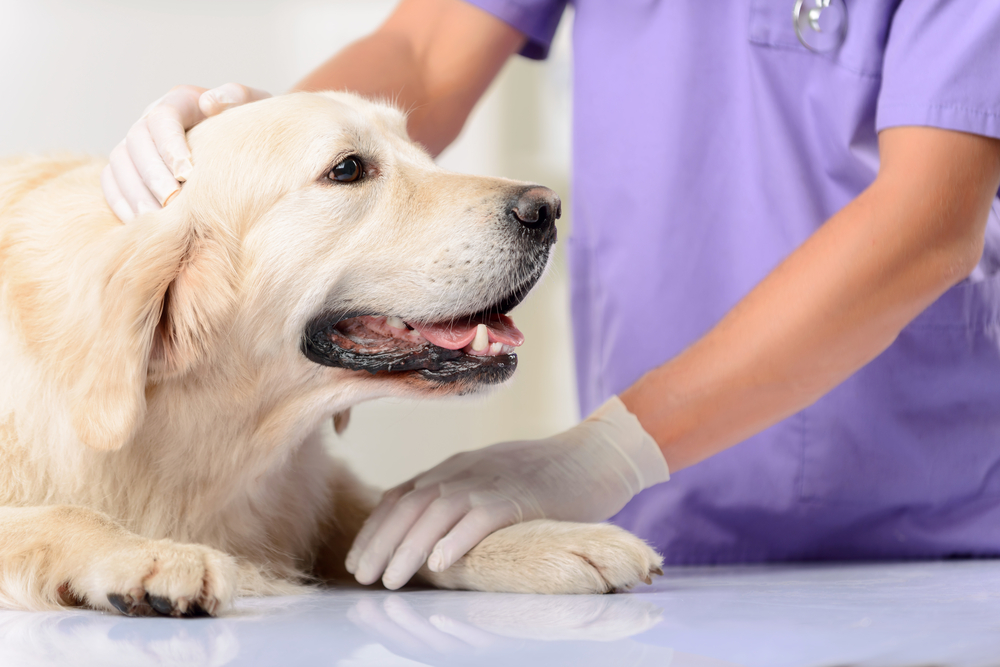Consider Donating Your Dog’s Blood to Save a Life
Just like humans, some dogs have serious illnesses or injuries that may require a blood transfusion. To perform blood transfusions, veterinarians need access to donor blood. This donor blood comes from other dogs whose owners have signed them up for blood donor programs.
The veterinarians here at
Gulf Coast Veterinary Specialists (GCVS) rely on these programs for blood products that help us care for thousands of animals each year. In some cases, a blood transfusion is a matter of life and death, so the donor dogs have actually helped to save the lives of other dogs in need. But how do dog blood donations work?
Blood Transfusions for Dogs
When a dog has been in an accident and lost a lot of blood or has a condition such as anemia, blood transfusions can be life-saving treatments. To keep the body operating normally, veterinarians will perform a blood transfusion using the blood of a healthy dog. This healthy blood is then introduced into the recipient’s body to help add blood or healthy blood cells to the dog’s system.
In most cases, donations from healthy dogs are received by animal hospitals from blood centers to help the veterinarians provide the treatments required to help the dog. Some hospitals run their own blood banks, however.
Top 10 Conditions Requiring Blood Transfusions
While there are numerous conditions that can benefit from blood transfusions, here is a list of the top ten conditions that need to be treated via blood transfusion:
Anemia: Anemia occurs when the body attacks its own red blood cells.
Ruptured Spleen: The spleen is a blood reservoir that can rupture and lead to the loss of blood.
Surgery/Hemorrhaging: Hemorrhaging during surgery leads to a loss of blood.
Rat Poisoning: Rodenticide ingestion can lead to spontaneous and uncontrolled bleeding.
Trauma: Trauma, such as being hit by a car or falling from high distances, can lead to both internal and external bleeding.
Sepsis: Sepsis occurs when bacteria enters the blood and leads to a blood infection.
Lungworm: Lungworm can cause bleeding and prevent blood clotting.
Gastrointestinal Bleeding: Bleeding in the stomach or intestines can be caused by ulcers or tumors.
Low Platelet Count: The level of blood platelets is too low.
Bloat: Bloat is a disease that causes the stomach to dilate and twist, which can lead to blood vessel damage, organ failure, and sepsis.
Risks
Blood transfusions save many lives, but they also come with their own set of risks that shouldn’t be glossed over. The most common risk associated with blood transfusion is acute hemolysis, which is rare in domestic animals. Acute hemolysis can be caused by immune problems, improper collection or separation of blood, freezing or overwarming of red blood cells, and infusing under pressure through a small needle.
Although very rare, sepsis is a complication that can arise in a patient that has been given contaminated blood. Diseases that are spread through blood can be passed from donor to recipient, as well, but the screening process is thorough and catches almost all issues before a recipient ever receives contaminated blood.
Why is Canine Blood Donation Important?
Much like humans, there are times when a dog’s best chance comes down to a blood transfusion. After serious injuries, dogs may need to have a blood transfusion to replenish what was lost during the injury or the following treatments or surgeries. In some cases, blood transfusions may be the only way to keep a dog alive.
For any pet owner with a dog in need, canine blood donations are very important, as they give the receiving dog a second chance at life. There is always a need for blood donations, and many veterinarians will rely on blood from one source to help them save the lives of as many pets as possible.
If you believe that your dog would be a good candidate for blood donation, you can contact your local veterinarian today to get started. For those who live in the Houston, Texas, area GCVS can help you find a place to donate your dog’s blood.
Each donation center will have different requirements and a different process for the blood donation. In most cases, it only takes a few minutes for your dog to donate blood, and anesthesia isn’t required.
After the donation process, which is very safe, dogs can be placed on an IV to help them recover; they also often receive food and treats.
Ideal donors will be healthy dogs that are up-to-date on vaccinations and flea and heartworm preventatives. All dogs will have their blood tested to determine the type and check for any diseases or illnesses. Dogs can either have “positive” blood or “universal” blood. Universal blood can be given to any dog, while positive blood can only go to other dogs with positive blood. Any dog that has previously received a blood transfusion is ineligible for donation.
GCVS is also available to help your pets with a variety of different medical needs, including
emergency and critical care, where a lucky dog may receive the life-saving blood your dog donated via blood transfusion. If your pet is in need of emergency care, call GCVS right away at 713-693-1111.

